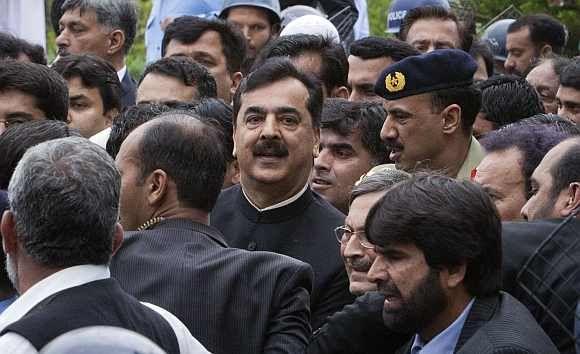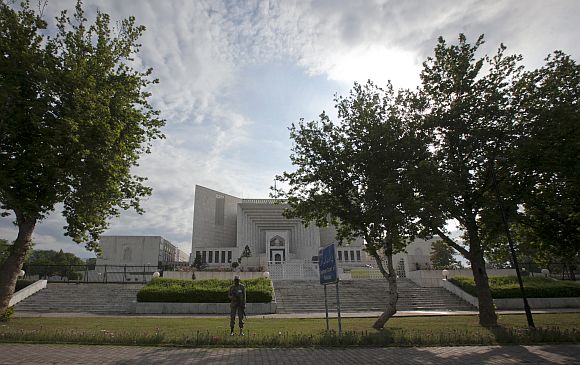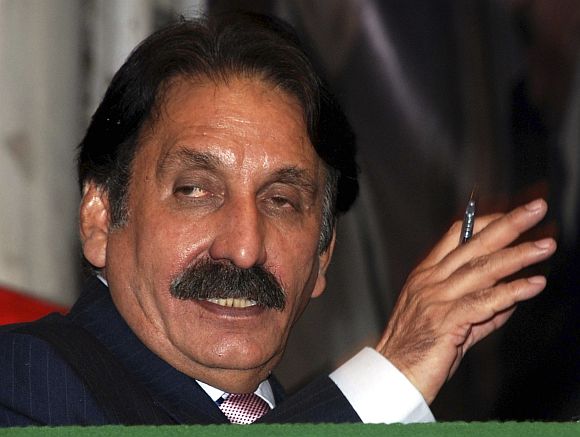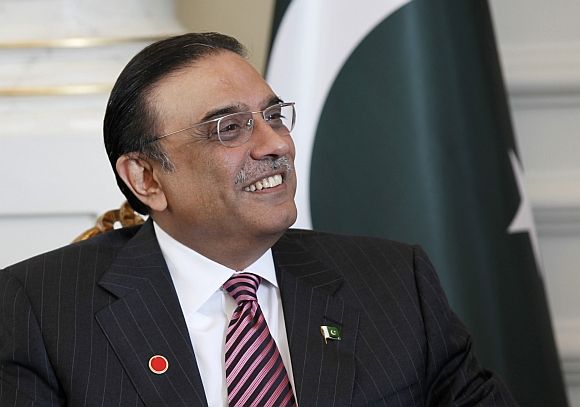 | « Back to article | Print this article |
Why Gilani will remain Pak PM despite conviction
Despite being convicted by the Pakistani supreme court on contempt of court charge, Prime Minister Syed Yousaf Raza Gilani will stay in his office as the chief executive of the country given the fact that conviction in itself is not enough to send him home, reports Amir Mir from Islamabad.
The power to disqualify a parliamentarian rests with the speaker of the national assembly who decides whether or not to send a disqualification reference to the election commission to proceed with. Even otherwise, the apex court has only convicted Gilani and not disqualified him from being a member of the parliament.
Although Pakistan's twice-elected former prime minister Nawaz Sharif has demanded the resignation of Gilani, his counsel Aitzaz Ahsan has simply ruled out any such possibility, pleading that firstly the court did not disqualify him, and secondly there is a laid down procedure for disqualification of a parliamentarian from the house, whereby the speaker of the national assembly is supposed to take up the case with the election commission within 30 days.
In case the speaker doesn't raise the question with the election commission, the case shall deem to have been referred to the election commission, which in return will have to give its decision in 90 days.
In this case, the Pakistan Peoples Party will have time on its side. Some even feel that the party can react to the court ruling by passing a resolution in favour of the prime minister or against the superior judiciary for violating the constitution through its verdict.
Please click NEXT to read further...
'Supreme court ruling illegal, unconstitutional'
In fact, Ahsan has already stated after the verdict was announced on Thursday that the prime minister has been convicted for an offence which was not even a part of the charge-sheet against him.
"I am simply surprised that although there was no charge against the premier of scandalising the judiciary, it was still made part of the judgment announced on April 26. In fact, the prime minister was charged with civil contempt, but has been convicted for judicial and criminal contempt which is unprecedented in the judicial history of Pakistan. Article 63 (1) (g) of the constitution under which the prime minister has been convicted did not apply to the charge that had been levelled against the prime minister. In my opinion, therefore, the honourable judges of the seven-member bench have literally violated the constitution," Aitzaz said, adding that an appeal challenging the apex court's decision would soon be filed.
Almost similar views were expressed by Attorney General of Pakistan Irfan Qadir: "With utmost respect, I have to say that the court order against Prime Minister Gilani is absolutely illegal and unconstitutional which has exposed the double standards of the Pakistani judiciary which seems to have forgotten the fact that it was none other than Gilani who had released and reinstated over 100 judges of the superior judiciary who had been sacked and arrested by General Pervez Musharraf. And unfortunately, the so-called independent judiciary of Pakistan did not have the guts to proceed against a military dictator (Musharraf in this case) on treason charges for abrogating the constitution even after his ouster from power".
Focus back on Chief Justice Iftikhar Chaudhry
The court ruling against Gilani has added to political uncertainty and tensions between the government and the supreme court, led by Chief Justice Iftikhar Chaudhry, who is considered close to the opposition leader and the president of his own faction of the Pakistan Muslim League, Nawaz Sharif.
The source of the current judiciary-government conflict is an alleged graft case against President Asif Zardari that involves kickbacks he allegedly received from Swiss companies when Benazir Bhutto was in power in the 1990s.
The supreme court had passed orders in 2009 that the government should write a letter to the Swiss authorities, seeking reopening of the graft cases against President Zardari which were withdrawn by the Musharraf regime in 2008.
But Gilani refused, saying the Pakistani constitution grants the president immunity under Article 248 from criminal prosecution while in office. But the court did not accept his plea and convicted him for flouting the court orders.
While Pakistan's key opposition party led by Nawaz Sharif has hailed the apex court's decision, the ruling PPP has bitterly criticised the verdict.
Pakistani Information Minister Qamar Zaman Kaira has said by appearing before the apex court thrice, the prime minister had shown his respect for the country's judiciary. He however said that while the Nawaz Sharif' convictions (handed down to him under by the judiciary the Musharraf regime) had been quashed by the same judiciary almost ten years later when he had returned to Pakistan in 2008 after spending ten years in self-exile in Saudi Arab, a prime minister from the PPP, Syed Yousuf Raza Gilani was conveniently sentenced.
"Conviction of the prime minister of a party which created and guarded the constitution is a continuation of the process of convictions against PPP leaders. Gilani is still respectable for the party and its workers as he stood by the graves of our Shaheed leaders", he added in an emotional tone.
Zardari will try his best to avoid a new PM at this time
Earlier, as a seven member bench of the supreme court convicted and sentenced Prime Minister Gilani (till rising of the court) under Article 63 (1) (g) of the 1973 Constitution.
However, the sentencing lasted for 30 seconds only as the apex court ordered him to be imprisoned until the hearing is adjourned. Soon afterwards, a special session of the federal cabinet in Islamabad reposed confidence in the prime minister and supported the measure of filing a review petition challenging his conviction for contempt of court.
The prime minister told the cabinet members that he still respected the court's decision, although it was against the set norms of judiciary. He told his cabinet members that the court decision would be challenged as soon as the detailed judgment is announced.
On the other hand, the leader of opposition Nawaz Sharif has declared that since Gilani is now a convicted prime minister, he should step down on moral grounds.
However, the PPP co-chairman President Asif Zardari is in no mood to replace his prime minister in the election year.
Well-placed PPP government insiders say getting elected a new prime minister at this crucial juncture to lead a coalition government and then continue as before won't be easy for the party leadership, which is why President Zardari will try his best to avoid such a scenario.
In fact, the numbers are no more in PPP's favour. In the national assembly, the PPP only have 126 MNAs, whereas for election of the new leader of the house the requirement is 172 votes.
The PPP can't afford at this point a whole new bargain with its major coalition partners, especially the Pakistan Muslim League-Quaid-e-Azam (having 50 seats in the National Assembly) led by Shujaat Hussain and the Muttahida Qaumi Movement (25 seats in the National Assembly) led by self-exiled Altaf Hussain.
Therefore, the apex court verdict seems to be yet another tough call for President Asif Zardari who has been lucky enough so far to come out of every crisis unharmed.
TOP photo features of the week
Click on MORE to see another set of PHOTO features...




